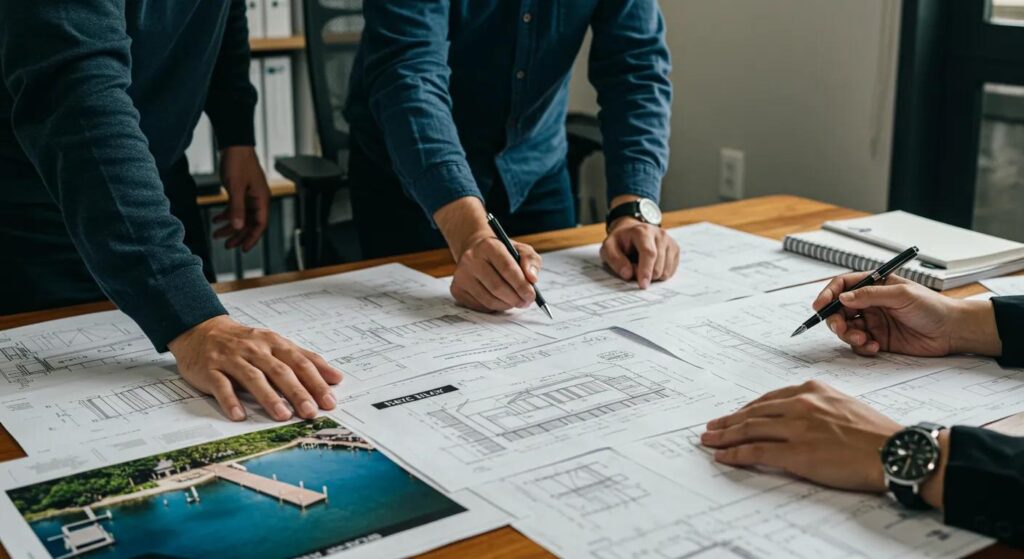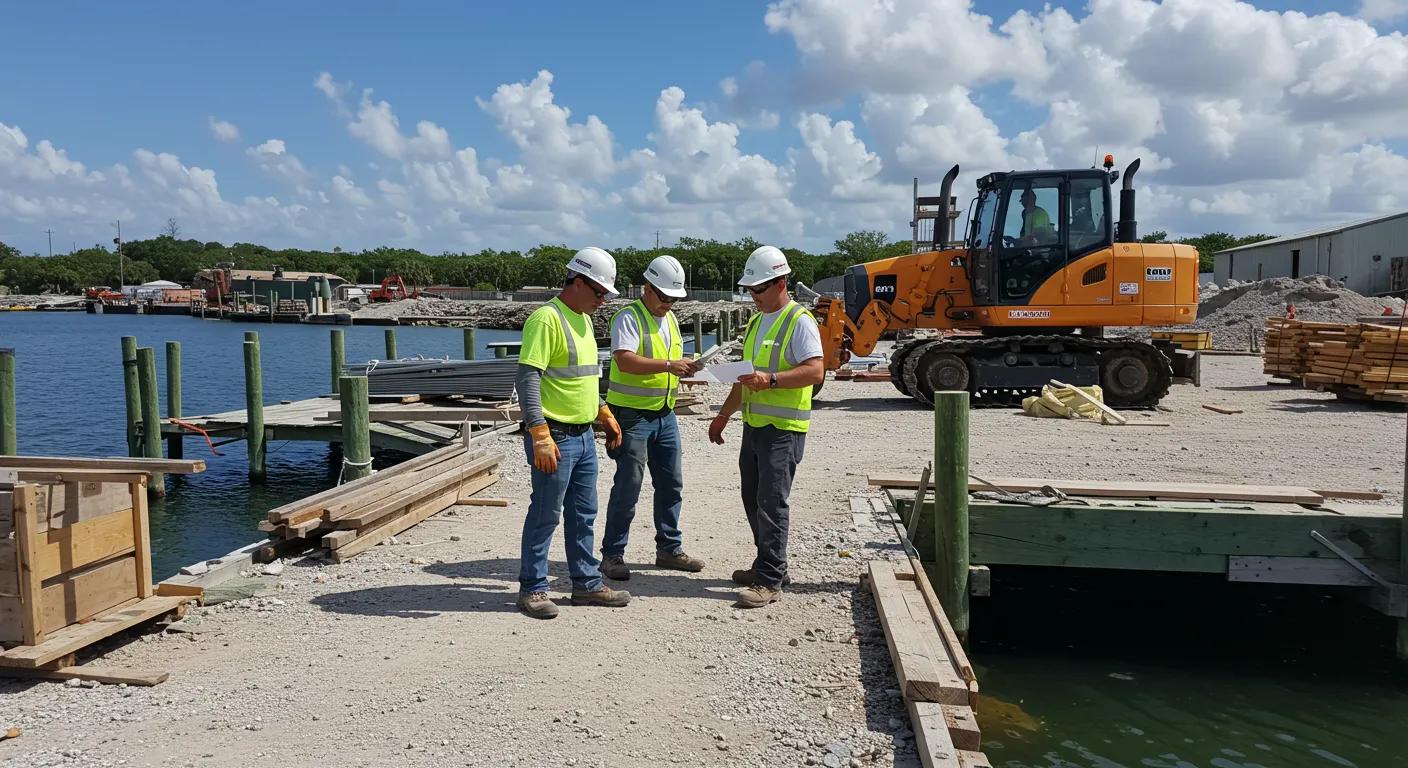Essential Factors to Evaluate When Selecting a Dock Construction Company for Your Project
In today’s waterfront construction landscape, selecting the right dockbuilder is a critical decision that affects your property‘s look, functionality, and long-term safety. Whether you envision a floating dock for leisure, a durable pier for mooringwatercraft, or a structure meeting strict building code requirements, a careful evaluation of potential contractors is essential. This guide walks you through the process—from defining your project requirements and assessing waterfront conditions to reviewing contractor experience, licensing, and regulatory compliance. This methodical approach is designed to help you confidently select a reliable dockconstruction company.
The article is organized into clear sections, each beginning with an image placeholder, to help you move from planning your project to finalizing a contract with a reputable dockconstruction company.
Defining Your Long Island Dock Project Requirements
Begin by clearly determining your project goals. Understand the specifics of your waterfront property and decide what you need from your new dock, considering structural, aesthetic, and functional requirements.
Assessing Your Specific Waterfront Conditions and Needs
Examine your waterfront’s unique features. Evaluate water depth, tidal patterns, and erosion issues that may affect a dock. For instance, properties with strong currents or seasonal fluctuations require builders experienced in erosion control and robust mooring technology. Document soil and water conditions to identify the best construction methods and materials.
Determining the Primary Uses for Your New Dock
Define the intended functions of your dock. It may be for recreational activities such as swimming and small boat docking, or for commercial purposes involving heavy watercraft and frequent loading operations. Consider anticipated traffic, safety issues (especially if children will use the dock), and ease of maintenance. If fishing or hosting gatherings is planned, ensure the design accommodates these activities.
Establishing a Clear Budget for Your Dock Building Venture
Set a realistic, itemized budget before contacting potential builders. Include estimates for construction, permits, materials, labor, and specialized engineering services. Also, plan for unexpected expenses due to environmental challenges or regulatory changes. A clear budget helps you compare contractor proposals and select the best value option.
Researching Initial Permitting Needs for Long Island Dock Construction
Understand the permitting process on Long Island, where local and state regulations are strict. Research the required permits and ensure potential builders have a proven record working with municipal agencies. Confirm they understand zoning restrictions, environmental protection standards, and building codes to avoid costly delays.
Outlining Your Ideal Project Timeline and Completion Date
Develop a realistic project timeline that considers seasonal weather, material lead times, and permit approval periods. Clearly communicate your expected start and finish dates with potential builders. A well-planned schedule helps manage expectations and ensures the dock is completed on time and to your specifications.
Essential Factors to Evaluate When Selecting a Dock Construction Company on Long Island

After defining your project, focus on choosing a construction company with proven experience in Long Island’s marine environment. Evaluate them based on their expertise, licensing, client testimonials, and approach to handling waterfront challenges.
Verifying Extensive Experience With Long Island Marine Environments
Choose a dockbuilder experienced with Long Island’s diverse conditions, including sandy or rocky shores, fluctuating tides, and regional weather challenges. Request case studies or project portfolios that demonstrate their ability to manage corrosion and erosion while complying with local regulations.
Confirming Appropriate Licensing and Full Insurance Coverage
Ensure your potential builder holds current licenses and comprehensive insurance. Licensing confirms adherence to industry standards and regulatory responsibilities, while full insurance—including liability, workers’ compensation, and bonding—protects you in case of mishaps during construction.
Reviewing Past Projects and Client Testimonials in the Area
Look for testimonials and references from previous clients with similar projects on Long Island. Examine project timelines, finished quality, and overall satisfaction. Positive reviews and documented success stories indicate that the builder can reliably deliver high-quality work on time and within budget, and that they understand client needs.
Assessing Their Knowledge of Local Building Codes and Environmental Regulations
A reputable dockconstruction company will know local building codes, erosion control measures, seawallconstruction standards, and marineecosystem protection guidelines. Ask specific questions about how past projects met these requirements; this ensures the contractor is prepared for the regulatory challenges unique to Long Island.
Understanding Their Approach to Site Evaluation and Project Planning
Evaluate the contractor’s process of surveying your property and planning the dock installation. Detailed site visits, comprehensive planning documents, and modern engineering practices signal a thoughtful approach. A systematic plan allows for proactive risk management and ensures that the design fits both your needs and environmental conditions.
What Are the Key Factors to Consider Regarding Dock Materials and Design
Choosing the right materials and design is crucial for a durable, appealing, and compliant dock. Factors include structural integrity, compatibility with your property’s landscape, and environmental suitability.
Comparing Material Options for Durability in Long Island’s Climate
Consider materials’ performance against saltwater, humidity, and seasonal temperature changes. For example, pressure-treated wood is economical but may require regular maintenance to prevent decay, while fiberglass and steel offer longer life with less upkeep. Compare the maintenance needs, replacement costs, and overall durability of each material under Long Island’s weather conditions.
Matching Dock Design to Your Property’s Aesthetics and Functional Demands
Ensure that the dock design complements your property’s style and meets your functional needs. Whether you prefer a modern, sleek dock or a rustic wooden design, balance aesthetics with practical features such as access points, boat lifts, and integrated lighting. Use visual renderings and sample plans to confirm that the design fits seamlessly with your waterfront environment.
Ensuring Design Adherence to Environmental Protection Standards
Environmental protection is key. Verify that the dock design minimizes ecological disruption through features like managed runoff systems, non-invasive anchoring, and sustainable material use. Confirm that the plan includes an environmental impact assessment to address any potential concerns and ensure that the project complies with local environmental regulations.
Inquiring About Custom Features and Available Dock Accessories
Discuss available customization options with your contractor. Integrated seating, built-in storage, specialized boat lifts, cable railing systems, and eco-friendly lighting are examples of features that can enhance usability and appeal. Determine which accessories best align with your lifestyle and long-term use plans.
Examining the Proposed Construction Methods and Engineering Soundness
Review the contractor’s proposed construction methods to ensure structural integrity and longevity. Modern techniques such as modular assembly or prefabricated components may help reduce construction time and costs. Evaluate any engineering analyses performed, including load-bearing calculations and stress tests, to confirm that the proposed design will withstand extreme weather and daily use.
Analyzing Quotes and Contract Details From Prospective Dock Builders

After narrowing your list, carefully analyze written proposals. Evaluate each bid to ensure you understand the scope of work, payment schedules, and warranty terms before making a decision.
Obtaining Comprehensive Written Proposals From Several Firms
Request detailed proposals that cover every aspect of the project—from design concepts and material specifications to labor, permit acquisition, and finishing touches. Look for clear timelines, potential risks identified during site evaluations, and contingency plans. This will help you understand market rates and compare the quality and scope of service offered by different contractors.
Comparing the Scope of Work and Material Specifications in Each Bid
Review the details of each proposal to ensure all critical components are addressed. Confirm that the specified materials, such as marine-grade wood, corrosion-resistant steel, or reinforced concrete, meet your durability and aesthetic standards. If any element is unclear, request further clarification to ensure you are comparing apples to apples.
Clarifying Payment Structures and Project Milestone Schedules
Make sure the payment terms are clearly linked to specific project milestones. Understand how deposits, progress payments, and final installments are structured. Ensure that the contract specifies what happens in the event of delays or additional work, to protect your budget and keep the project on schedule.
Scrutinizing Warranty Provisions and Aftercare Service Commitments
A solid warranty and aftercare plan are markers of a confident contractor. Ensure that the warranty covers materials and workmanship and inquire about aftercare services such as routine maintenance or emergency repairs. A long-term maintenance plan can help secure your investment and ensure continued dock performance over time.
Identifying Any Potential Hidden Costs or Exclusions
Review the contract for hidden fees or exclusions related to permitting, site preparation, or additional labor. A clear, itemized breakdown of costs will prevent unexpected financial burdens later and ensure that your budget remains accurate.
Evaluating a Dock Construction Company's Communication and Professionalism
Strong communication and professionalism are essential for a smooth construction process. Choose a contractor who is responsive, clear, and proactive in addressing issues.
Gauging Their Responsiveness and Openness During Initial Consultations
During early consultations, note how promptly the contractor responds to questions and shares details about potential challenges and limitations. Early transparency sets the tone for a collaborative relationship throughout the project.
Understanding Their Process for Keeping You Informed of Progress
Ask about the contractor’s procedures for updating you on project milestones, such as sending periodic photographs or progress reports. Regular communication helps prevent misunderstandings and keeps the project on track.
Assessing Their Problem-Solving Abilities and Attention to Detail
Every project encounters unforeseen challenges; inquire about previous experiences where the contractor resolved issues effectively. Their ability to adjust timelines and offer solutions indicates strong project management and commitment to quality.
Checking Their Reputation for Adhering to Timelines and Budgets
Request references or case studies that confirm the contractor’s ability to finish projects on time and within budget. A history of punctuality and fiscal discipline is a reliable indicator of a trustworthy partner.
Ensuring a Good Working Relationship and Mutual Understanding
A successful project depends on a respectful, communicative relationship. Ensure the contractor’s communication style matches your expectations and that they view the project as a partnership rather than just a business transaction.
Making the Confident Choice for Your Long Island Dock Installation

After examining all factors, consolidate your findings to make an informed decision. Choose a contractor whose technical expertise, regulatory understanding, and communication skills best match your project needs.
Weighing All Gathered Information on Each Potential Builder
Summarize the information gathered from consultations and proposals. Use a checklist or comparison table to objectively evaluate each contractor’s experience, licensing, client testimonials, and overall suitability for your project. This holistic review helps identify the best candidate for your dockconstruction.
Considering the Overall Value Beyond Just the Quoted Price
Focus on overall value rather than just the lowest bid. Assess the quality of materials, scope of work, and aftercare services offered. A slightly higher quote that provides comprehensive service and superior quality may better protect your long-term investment.
Finalizing Your Selection and Formalizing the Agreement
Once you’ve chosen the best contractor, carefully review and finalize the contract. Ensure that all details, including payment schedules, warranty terms, and contingency plans, are clearly documented. A transparent contract builds trust and protects your interests throughout the construction process.
Preparing Your Property for the Dock Construction Process
Before work begins, prepare your property by clearing the shoreline, ensuring utility access, and confirming all permits are in order. Collaborate with your contractor on a pre-construction checklist to minimize delays and set the stage for smooth execution.
Looking Forward to a Quality Dock Built by a Reputable Company
With evaluations complete and contracts formalized, confidently proceed with your dock installation. A well-constructed dock not only increases property value but also enhances waterfront enjoyment, safety, and functionality over many years.
Comparison Table of Key Attributes in Dock Construction
Before moving forward, refer to the table below for a quick summary of key factors when selecting a dockconstruction company:
| Factor | Key Attribute | Benefit | Example Data/Notes |
|---|---|---|---|
| Experience | Years of Local Projects | Indicates regional expertise | 10+ years working in Long Island marine areas |
| Licensing & Insurance | Valid Certifications | Reduces liability risks | Full coverage, verifiable licenses |
| Material Quality & Durability | Marine-grade materials | Ensures long-term durability and aesthetics | Use of corrosion-resistant steel and treated wood |
| Communication & Professionalism | Responsiveness | Facilitates project smoothness | Regular progress updates, clear milestones |
| Warranty & Aftercare Services | Extended warranty, support plan | Guarantees long-term performance and repairs | 5-year material warranty, scheduled maintenance |
| Cost & Transparency | Detailed, itemized quotes | Prevents hidden charges and surprises | Comprehensive proposals with clear scopes |
This table serves as a checklist to quickly compare critical attributes across different dockconstruction companies.
Frequently Asked Questions
Q: How do I determine the right size and design for my dock? A: The right dock size and design depend on your waterfront conditions and intended use. Evaluate water depth, tidal influences, and desired functionality—whether for boat docking or recreational use. Consult with experienced dock builders to receive custom recommendations that balance visual appeal with structural integrity, while complying with local building codes.
Q: What materials are best suited for Long Island’s coastal weather? A: Pressure-treated wood, fiberglass, and corrosion-resistant steel are among the best options because they withstand saltwater, temperature fluctuations, and humidity. Each material has its merits: wood offers a classic look, while fiberglass and steel require less maintenance and ensure superior longevity. Discuss your needs with a marine contractor to choose materials that meet both budget and durability targets.
Q: How important is it to verify a dockbuilder’s licensing and insurance? A: It is critical. A licensed builder meets industry standards and local regulations, while comprehensive insurance protects you from liability in case of construction mishaps. Verifying these credentials upfront can prevent costly disputes later on.
Q: What type of maintenance is required after my dockis installed? A: Maintenance requirements vary by material and environmental conditions. Regular inspections for corrosion, wood decay, and structural issues are recommended—typically on an annual basis. Some docks may need periodic refinishing or hardware replacement. A reputable contractor will provide specific maintenance guidelines and may offer ongoing aftercare services.
Q: How can I ensure that my project stays on schedule and within budget? A: Detailed planning and clear communication are key. Obtain written proposals outlining milestones and costs, choose a contractor with a proven track record, and set realistic timelines that include contingency plans. Regular progress updates help you address issues early, keeping the project on track both timewise and budget-wise.
Final Thoughts
Selecting a dockconstruction company is a multifaceted decision requiring careful review of project requirements, contractor experience, material quality, and communication effectiveness. By thoroughly assessing each factor and comparing detailed proposals, you can secure a high-quality dock that meets both functional and aesthetic goals. With a reputable contractor who adheres to local regulations and best practices, your finished dock will not only elevate your property’s value but also provide years of safe and enjoyable waterfront access.



